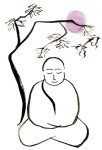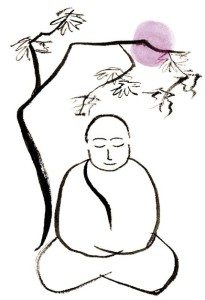Many Buddhists have heard the story about the fellow who was a good meditator and was proud of it. He developed an arrogant personality and his acquaintances sometimes wished something would knock him off his self-made pedestal. But instead of an event that would deflate his ego, an event occurred that puffed him up even more to the point that he became insufferable. He was invited to India by a high Tibetan lama to learn the highest secret teaching of Buddhism.
He was quick to remind others that it was he, not they, who had been selected to learn the highest teaching. His arrogance grew as the date for the long trip to Tibet approached and by the time he left many acquaintances were hoping he would stay in Tibet.
The big day finally came and he entered the room where the holy teacher awaited him. The teacher leaned forward and whispered in his ear: “Be kind.” With that, the holy one rose and quitted the room.
Obviously, this story was told by the once arrogant fellow because we could not have known what happened on that day if he had not revealed it, out of kindness.
The doctrine of no-self is not as deep as it seems to be. It just means that all of us are in a state of constant change and thus there is no entity of whom we can say: There I am. Of course it has deep implications – who was born? who dies? but even that is not hard to understand.
All of the famous Buddhist doctrines are that way – seemingly deep but really quite shallow and easy to explain once understood. Even the doctrine of dependent origination seems ridiculously obvious once it is understood. It’s very obviousness is part of its mystery.
It is the discursive mind that turns obvious truths into deep mysteries. As we develop our minds through mindfulness and meditation, we can understand how simple Buddhism really is. It’s a practice and if we spend a lot of time studying its various doctrines, neglecting the practice, the mysteries seem to deepen. Practice reveals the deepest mysteries without need for discursive thought.
So we can practice being kind and being shallow. We do our practices, and don’t waste time with discursive thought. It is practice that makes the mind clear, not study of doctrines.
And if the deepest instruction we can ever receive is the instruction to be kind, that’s all we need to know. And that is not a deep thought. If we are kind and do our practices every day, we never need to have any deep thoughts. We can be kind and shallow, kind and simple.

